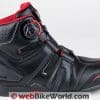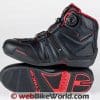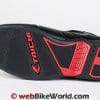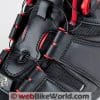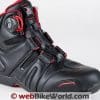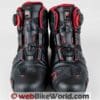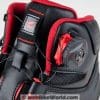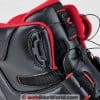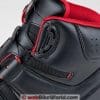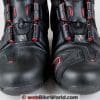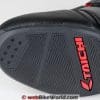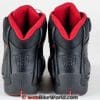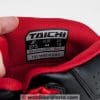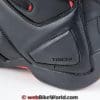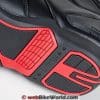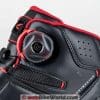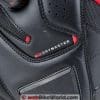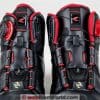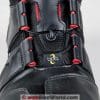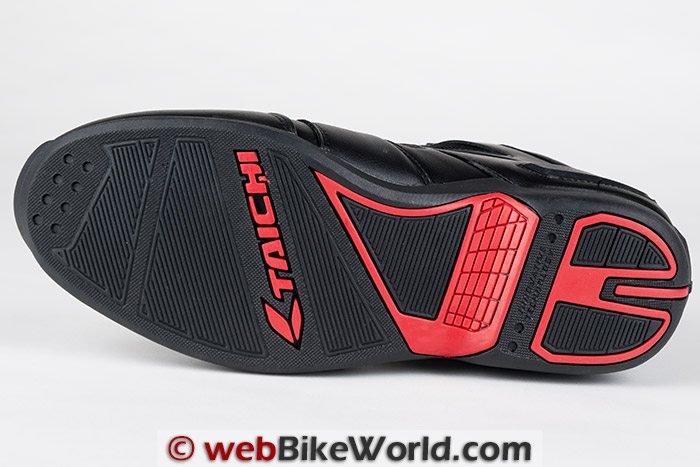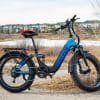The RS Taichi RSS006 Drymaster Boa Riding Shoes are a good mixture of form and function.
The shoes — or boots — have some style without being over-the-top and the protective features are good for a motorcycle boot or shoe of this style.
The Boa lacing system is the star of the show here.
It eliminates the traditional textile laces and replaces it with steel cables and a winding knob.
“Riding shoes”. It seems just a few years ago we were just getting used to the idea of “short riding boots”, but recently the term “riding shoes” has been cropping up as a new generation of footwear designed for motorcycle riding.
Some of the new generation of riding shoes even look like the old high-tops from the ’70’s and ‘80%he ’70’s and ’80’s (showing my age), such as the VQuattro Milano Academy boots (review) recently reviewed on webBikeWorld.
I would normally shy away from anything termed a “riding shoe”, as the description doesn’t make me think of a particularly protective piece of gear.
But this is simply my opinion, and many of the riding shoes available do have protective features, to a point, but often they’re not protective enough for my liking.
So when I discovered the RS Taichi RSS006 Motorcycle Riding “Shoes”, I didn’t think I’d like them.
Sure — they had some neat features and interesting style — but if they didn’t protect my feet, then they would quickly find themselves tossed aside.
Fear not: without trying to give too much away too early on, I will say that the RSS006 riding shoes have not been tossed aside and, in fact, I’ve been wearing them quite frequently. In this review, I’ll explain why.
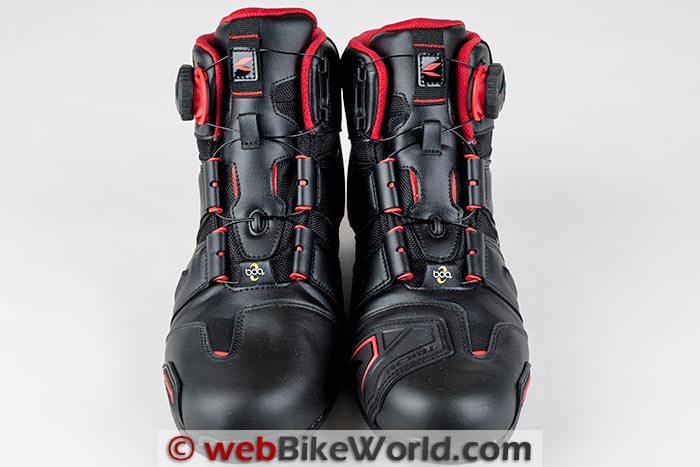
RS Taichi Background
RS Taichi is not a brand that may sound familiar to everyone. But the company has been around since the mid-1970’s, starting as a motorcycle shop.
It wasn’t long after that Taichi Yoshimura, the founder and former Suzuki and Honda factory motocross rider, started work on developing his own products.
I was aware of the RS Taichi brand and I knew that they produced racing suits and gloves, but it turns out that their products span a much wider range than I realized.
The current RS Taichi motorcycle clothing lineup includes base layers, protective gear, luggage and, of course, footwear.
The RS Taichi RSS006 Drymaster Riding Shoes: Styling
The first thing I noticed when taking the RSS006 Riding Shoes out of the box was that they didn’t seem like “shoes” at all; instead, their height places them solidly in the “short boot” family.
The construction is also a lot more robust than what I think of when I hear the word “shoe”. The styling on the RSS006 “boots” straddles the line between high-tech racer and hiking boot.
At first glance, they may pass for a styled hiking boot, but a closer look will reveal that there’s more to them than that.
The looks are an important factor for me, as I often commute to work on my bike and I don’t like to be bothered with having to change shoes (or boots) when I arrive at the office.
While I can get away with wearing the RSS006 black boots with their red accents most of the time, there are times when I feel better going back to something with a bit more subtle styling, like my Tourmaster Response 2.0 boots (review).
Obviously everyone’s work situation is different, so this may or not be a factor for you.
The black and red version of the RSS006 shoes are actually the most conservative of the four color variations available.
The other options are Charcoal/Pink, Black/White, and Black/Neon (actually black and a high-visibility yellow). All of the other color options besides the Black/Red have more of the colored areas on the upper part of the boot.
This is a good thing for the Hi-Viz version, but you’ll have to decide whether you like the other colors or not.
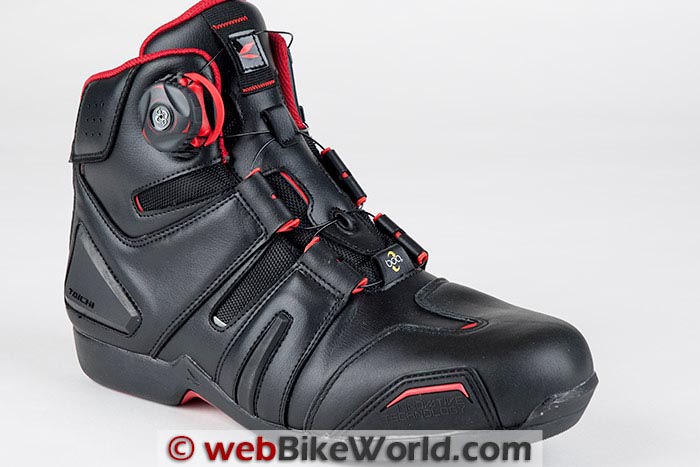
Construction
The RSS006 upper is leather construction with rubber pads and patches in various locations. The left shoe incorporates an additional rubber pad to protect the top from abrasion by the shift lever.
The tongue is a mix of some type of coarse nylon textile and leather.
The leather section of the tongue holds the guides for the Boa closure system cable, which I’ll describe later. The guides are a combination of a molded plastic tube and a leather loop cover.
The upper part of the tongue has a textile loop in the center, which is used as a guide and is home to the “wing” RS Taichi logo.
There are a couple of thin strips of textile, which are part of the tongue and gusset, visible on the sides in between what are essentially leather straps that hold the plastic guides for the Boa closure system.
The liner is referred to as a “Drymaster Inner Booty” but I couldn’t find any details about the type of material used in its construction.
It feels like a smooth nylon (smoother than the outer facing textile of the tongue) and is not too soft, but not rough either.
On the black and red version of the RSS006 shoes, the lining is the same shade of red found in the various accents around the surface and sole of the shoe. The other RSS006 colorways receive a light gray lining.
The soles of the RSS006 are made from a type of rubber and they’re rather thin for a motorcycle boot and the tread pattern is decidedly on the fine side.
There are no large lugs or channels in the molding, save for the Taichi name and logo embossed in red under the ball of the foot.
The arch is shallow and it’s just deep enough to hold the foot in place on foot pegs.
The surface of the sole was a bit less than grippy the first time I wore the shoes; I noticed they just didn’t hold very firmly to the foot pegs or the asphalt until I took a minute to scuff them up a bit on the pavement.
Once the scuffing was complete, the soles felt more securely connected to the ground and the foot pegs.
It’s a little thing, but basically I’m thinking they need to be treated like a new set of motorcycle tires.
The back of the sole curves up and extends about 24 mm above the rest of the heel to the sides.
Above this, behind the Achilles tendon, is a reflector covered with a perforated piece of leather showing nine 1/8″ diameter holes that reveal the reflective material underneath.
Surprisingly, the reflectors are quite bright but it seems odd to cover up a large portion of it with perforated leather; leaving the entire patch visible would make for a very bright point of visibility.
Overall the construction of the RSS006 shoes is very solid.
The stitching is very uniform and a lot of it is double-stitched for durability. While the shoes are relatively light weight, they have a solid feel, and the quality and thickness of the leather is very good and appropriate for the price point.
The only area that could use a bit of refinement would be the edge where the rubber sole meets the leather upper.
Several photos show how it appears that the bonding agent has seeped out of the gap when these sections were pressed together and then the glue dried and remained in place.
It might be easy to overlook but I think the problem is that everything else is so cleanly finished that it makes this stand out that much more.
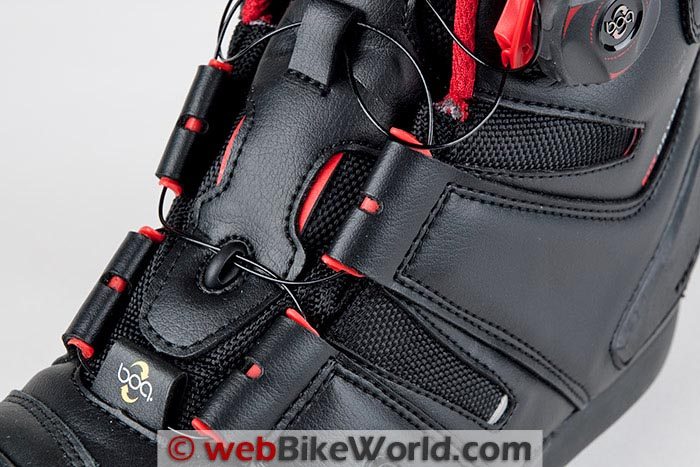
The Boa Lacing System
The RSS006 Drymaster Riding Shoes eschew traditional laces or hook-and-loop fasteners in favor of a lacing system from Boa Technology.
The Boa system uses a ratchet-like wheel, a coated steel cable and nylon runners to secure the RSS006 boots.
This, for me, is one of the most exciting aspects to these shoes, as it saves time and seems safer for motorcycling because there is no chance of an errant shoelace finding its way to a spinning gear or chain.
The Boa wheel is located in front of the ankle on the outside facing side of each shoe.
Once you slide your foot into the shoe, all that is left to do is turn the wheel a number of “clicks” to apply an even and secure closure.
To unlock the wheel, simply pull it out to release the cable and the shoe easily releases and opens.
Although the Boa wheel does click as it is tightened, it is not a true ratchet action as you cannot turn the wheel backwards and forwards repeatedly to tighten the cable.
Still, it doesn’t require much rotation to tighten the cable but it could be even faster if it did have a ratcheting action.
The cable passes through several nylon runners as it laces up and down the shoes and the cable is coated, so it slides smoothly through the runners as it is tightened.
This allows for a very evenly distributed binding, which means that the loose and tight spots are essentially eliminated and in the end, the system provides a very strong and “custom” fit for the wearer.
A strong and personalized fit is great, but the Boa system also adds simplicity and convenience.
I am currently reviewing a one-piece motorcycle riding suit and while it is possible to put it on without removing my boots (or shoes) I am concerned that the rubber soles will catch and tear the lining.
But I don’t mind taking off or putting on on the RSS006 shoes to don the suit or remove it because I can get both RSS006 shoes on my feet and closed before I can even finish tying one of my lace-up boots.
The same applies to removing the RSS006 shoes, as the smoothly sliding cable and runners makes it easy to spread them open and remove them.
I’m obviously smitten with the Boa lacing system and I think it has a lot of potential for other motorcycle shoes and boots.
The Boa lacing system has been described in previous webBikeWorld reviews, including the Knox Handroid glove review.
In that review, Rick described a few of the details about the Boa system in general, so if you’re interested in learning more about Boa lacing system I would direct you there rather than reinvent Rick’s wheel.
Protective Features
As I mentioned earlier, since this is a riding “shoe”, I expected they might have some concessions as far as protection is concerned. But while there are couple, it’s not as bad as I anticipated.
Let’s look at the good stuff first. The RSS006 shoes are made of some type of nice, thick leather — according to my purely unscientific method of “looking and feeling” it.
The leather alone seems like it would hold up well under adverse sliding conditions, but that isn’t the first line of defense.
Placed strategically around the shoes are pieces of TPR (Thermoplastic Rubber) that would probably take the brunt of impacts and abrasions.
On both sides of the heel there is a large triangular shaped pad with an embossed Taichi label that is about 1/4″ or so thick (though I can’t directly measure it).
On the outside facing side of each shoe (right on the right, left on the left) there is thin strip of the same TPR that starts at the sole just behind the base of the toes and rises about two inches.
Towards the front of the toe box is another, thinner patch of TPR which includes a small strip of the accent color as well as a lightly embossed “Innovative Technology” phrase.
The heel cup and toe cup are both reinforced and I believe they are constructed with more TPR; I can certainly feel something substantial when trying to press in on the front of the toe box and around the area surrounding the heel.
It’s not hard plastic or composite like in some racing boots but seems rather robust for a riding “shoe”.
Over both sides of the ankle bone (malleolus) is an additional patch of perforated leather that seems to have some foam padding underneath.
It’s hard to tell if there is in fact extra padding or if it is just the way the extra piece of leather feels, but in any case, there is some extra impact protection in this area.
So far so good, but there are a couple of other things that could make these riding shoes even better.
I just mentioned the protection around the malleolus as being present but ambiguous as to what it really is. A substantial plastic or rubber cup in this position would make me feel better about the level of protection.
The other issue is that the sole does not appear to contain a shank.
A shank is a stiff piece of material (metal or plastic usually) that is used to stiffen the sole.
The benefits of having a shank in the sole are first that it keeps the sole from flexing in a way that could damage the bones of the foot in the event of a crash.
Second, it can help reduce foot fatigue on long rides, as the pressure of the foot pegs on the sole is spread out across the shank.
Finally, a shank can (depending on the shape) help prevent sharp objects from penetrating the sole, both in the event of a crash and when walking around places like the shop, the garage and other locations.
I’m surprised that the shoes of the RSS006 shoes don’t have a shank, as this feature has been present in many riding boots I have owned that cost much less.
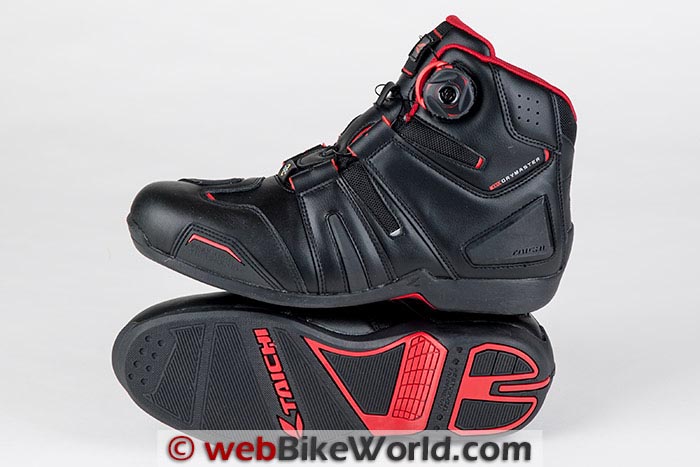
Sizing, Fit and Comfort
The RSS006 shoes I have are Euro 44 (US 10.0-10.5). I normally wear a US size 10.5 in most shoes.
I want to mention though that it seems the jury is still out on what size equates to what.
I recently received another pair of boots to review from a different manufacturer and they have a tag inside that says size Euro 44/US 11, so go figure.
The length feels good, as my toes seem to rest right where they should in the toe box. Vertically in the toe box there seems to be a bit more space than necessary, at least for my feet.
This can be easily mitigated with thick socks or a cushier insole, but thanks to the Boa lacing system, it proves unnecessary.
The lining of the RSS006 shoes is smooth but not slick and the padding that is present up around the ankle area doesn’t make it into the lower portion of the shoes.
Perhaps this lack of padding in the lower part of the shoe is what makes the toe area feel more “open”.
Despite the thin soles, the RSS006 shoes are very comfortable. I have worn them both on the bike and at work and just generally walking about and they are as comfortable as a hiking boot.
They were stiff for the first week or two but broke in nicely.
The only odd thing was that after about two to three weeks of wearing, the shoes started to squeak when I was walking — and it wasn’t subtle.
There was no sneaking up on anyone around the office (not that I would do that) for a while. After about a week or so the squeaking just disappeared on its own.
As far as ventilation I haven’t had warm weather yet to see how they perform in the heat. I will say that I don’t feel much of a breeze through them, however.

Water Resistance
So the RSS006 shoes have proved to be more protective than I expected for a riding “shoe” and they also fit well and feel secure, thanks in large part to their Boa closure system, but are they waterproof?
Well, with a name like “Drymaster” I would expect that they should indeed be masters of dryness.
That expectation was tempered by the disappointments I’ve had in the past from boots claiming to be waterproof and then have them fail the webBikeWorld “Bucket Test”, where I submerge the boots up to the top of their waterproof lining for 5 minutes.
So how did they do? Superbly. The RSS006 Drymaster Boa Riding Shoes definitely live up to their name.
After a full five minutes in the bucket, not a drop leaked in that I could detect.
What’s more is that when I pulled them out of the water they were still nice and light, meaning they didn’t even absorb much, if any, water in the mid-liner or other area between the leather and liner.
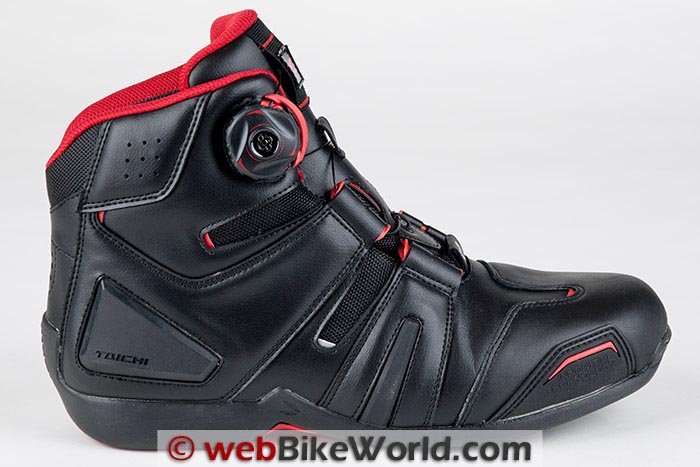
Conclusion
The RS Taichi RSS006 Drymaster Boa Riding Shoes were quite a surprise to me, because I didn’t think I would be interested in wearing a riding “shoe”, much less on using them as my go-to daily riding footwear.
But that’s exactly what I have been doing.
The quality of the materials and the construction are pretty much on par for the price point. Cleaning up of the bonding agent between the sole and upper would leave nothing else to pick on as far as that goes.
The lack of a shank in the footbed is a bit of a sore spot with me, as this feature both increases protection and comfort.
The RSS006 shoes provide so many positives, however, it is easy forgive the lack of the shank when one considers the comfort, waterproofing, and the fast and secure lacing system.
For the money, they seem a good value, even at their $199.95 asking price.
Add in a shank and some more robust malleolus protectors and I would bump them up to an excellent value.
| wBW Review: RS Taichi RSS006 Drymaster Riding Shoes | |
|---|---|
| Manufacturer: RS Taichi Available From: Moto Liberty |
List Price (2014): $199.95 |
| Colors: Black with White, Red, Neon. Charcoal/Pink. | Made In: China |
| Sizes: 37-48 Euro | Review Date: March 2014 |
Note: Item provided by a retailer, distributor or manufacturer with these Terms and Conditions.
Owner Comments and Feedback
See details on submitting comments.
From “G.N.” (May 2014): “After reading the wBW review of the RSS006 Drymaster boots I decided to take the plunge and visit a local RS Taichi stockist. And I have to say that I am amazed by the boots.
I was looking for a high quality, casual looking riding boot that can also be worn everyday off the bike and it will be a huge bonus if they are waterproof or, at least, wallet friendly – which means these boys tick all the boxes.
I’ve never bought an RS Taichi product before but the review coaxed me into at least seeing the shoes in person.
The review is spot on, especially in regards to sizing. I usually wear size 11 US and the size 11 RSS006s that I purchased felt very roomy compared to my other size 11 shoes. However, the Boa lacing system ensures a good, snug fit.
It also means it can be worn and taken off very quickly – why has no one else ever thought of this system in the last 2 decades?
My problem is that I have BIG ankles and wide feet but with normal length which means in the case of boots I almost always have to order a size or two too large to accommodate them.
The Boa lacing system eliminates such problems completely and with this specific model, the width is also assuredly generous, making it very comfortable right out of the box.
I’m very glad to know that these bad boys passed the wBW Bucket Test and that they have moderate crash protection – I sure hope I will never have to test the latter.
I went with the conservative black/red model because the other colors can and will get dirty too quickly and I don’t like being OCD about cleaning my shoes.
Overall, these shoots (“Short boots”) are highly recommended for any kind of rider.
Trust me, I have seen riders going to work in their dress shoes (on Ninja 250s to boot) which cost the same if not more than these without offering any safety feature whatsoever.
And I wonder why they just won’t invest in true riding boots like these, which at least look cool and kinda fit the bikes they ride, and stow their dress shoes in their office lockers instead.
Here’s to a million more wBW articles and please do more RS Taichi reviews – from what I saw in the store, they also make excellent jackets, pants and other accessories.
The gloves, at least the ones available in the store, are a bit “budget” but it’s probably because Indonesia does not have falls and winters so the more high tech gloves are not imported here.
MSRP seems to be strictly controlled; I paid IDR2,160,000 for RSS006s which roughly equates to USD200 like you mentioned in your review.”
From “B.B.” (April 2014): “Based on the wBW review I ordered a pair of these boots. I normally wear a size 11 (or larger) shoe.
I received the boots in a very timely manner but they were huge. I emailed (them) and got a quick reply back.
I used to live in Dallas (but am in Chattanooga TN now) and have bought from Moto-Liberty before at their store and have been very pleased with their selection and service in the past and was not disappointed this time with this mail order.
However, the boots were so large that I told (them) that I would need to return them in exchange for a size 10.
Once they received the shipment (I got an email that they had got the package) the next package was on its way without any additional shipping charge.
I deliberated several times over the BOA Technology used in the laces as I was not familiar with the system and was concerned about the durability over time.
However, it seems that this process is in extensive use across the athletic foot ware market and started with snow board boots.
To top it off, there is a lifetime warranty on the system with replacement parts sent free of charge.
You can find out more at www.boatechnology.com.
Once I knew more about BOA from researching on their website I felt a lot better about the product. The new boots showed up and were still a bit large but I’ve decided to not do another exchange.
I can deal with the size issue with thicker socks so I’m not that concerned. However, I’ve not worn a size 10 shoe since my early teens.
IIf I was buying in person at the Moto-Liberty store I would have tried a 9 or 9.5 but really didn’t want to spend another $16 on shipping the shoes back. It’s “not” that expensive but the size is well within my tolerance limits 🙂
I wore the boots today on my ride into work and all seems well so far. I think I will be happy with the BOA Technology lacing system. It is easy to use and pretty slick.
I will take the word of the review as to the water resistant/water proof nature. I’m sure that will get tested in the real world soon enough.
More personal note is that they run at least a full size large so keep that in consideration if you are ordering from the Internet.”
UPDATE From “B.B.” (April 2014): “I need to send you an update on the boots in regards to sizing.
When I looked closer at the label inside the boot itself, it showed 45 Euro and 11 US.
That means that the original boots that I ordered, which were 47 Euro and listed as 11 US on their site where in reality a much larger US size boot.
I sent an email to Moto-Liberty this morning and got a phone call from Nathan who handles the Taichi line for them.
It seems that the actual sizing from Taichi and the sizing on the website where not in sync with each other.
By the time I spoke with Nathan he had fixed the website information to reflect the actual sizing in the real world.
That means the original boots that I received labeled 47 Euro was actually a 12.5-13.0 US size and the second pair that I received was 45 Euro and a 11 US size – which jives up with the label inside the boot.
He apologized profusely for the mix up and took full responsibility for the sizing problems.
He said that part of the problem was that there is not a “one-to-one” sizing correlation between Euro and US sizes and also that Taichi had changed how they labeled some of their products recently.
He is sending out a third pair of 44 Euro / 10.0-10.5 US boots today along with a shipping label to cover the costs to get the second pair back to him at no charge to me.
The bottom line is that the sizing situation that was mentioned in the wBW review is accurate in that the boots do run a half size to full size larger than most footwear.
And also the Moto-Liberty site has updated their information to reflect the actual sizing as Taichi represents it AND that they took responsibility for the issue and took care of their customer.
So, despite the hassle related to sizing and shipping back and forth, I’m happy with the boots and happy with Moto-Liberty.”


